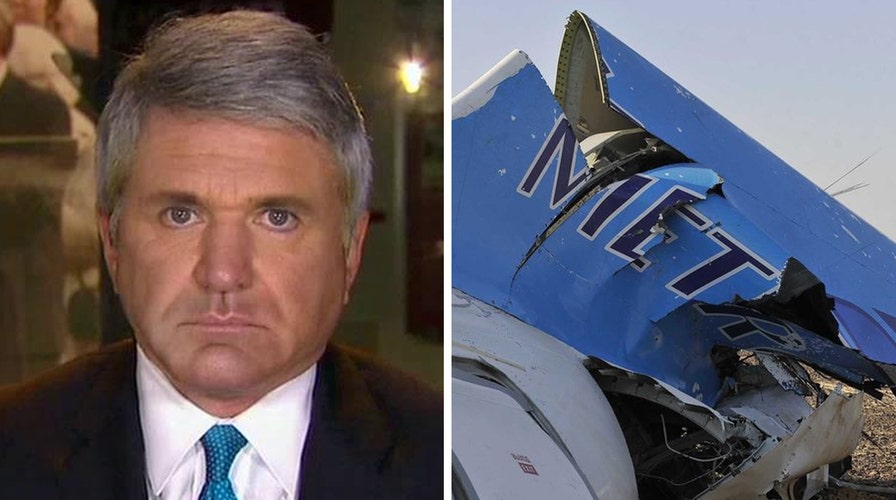Rep. McCaul on downed Russian jet, growing terror threat
Chairman of the House Homeland Security Committee on 'Fox News Sunday'
Top congressional lawmakers expressed little doubt Sunday that ISIS is responsible for the recently downed Russian jetliner and called for heightened security and a revamped U.S. foreign policy to prevent a similar attack on an American passenger jet.
The calls for a more aggressive response were made by Capitol Hill Democrats and Republicans, including leaders in intelligence, foreign policy and homeland security.
Texas GOP Rep. Mike McCaul, chairman of the House Homeland Security Committee, told “Fox News Sunday” that he has a “high degree of confidence” that ISIS planted a bomb on the Russia-bound plane that exploded in midair on Oct. 31 in Egypt's Sinai Peninsula, killing all 224 people on board.
He also said that the Transportation Security Administration has been "proactive" in ordering additional screenings and other measures but suggested the Obama administration’s tepid efforts to destroy the Islamic State terror group in Syria and elsewhere in the Middle East is in large part to blame for the tragedy.
“The sad fact is, because we've had a failed policy and failed leadership, now we're having to rely on Russians and the Iranians to go into Syria to fight and destroy ISIS,” McCaul said. “And that's kind of where we are today. I think … it's this weakness invites aggression.”
Reps. Peter King and Adam Schiff, members of the House Intelligence Committee, expressed similar conclusions that a bomb inside the aircraft likely caused the accident, based largely on intelligence reports and flight-recorder data. And they called for a more aggressive foreign policy.
“This has to be an all-out effort,” King, R-N.Y., told ABC’s “This Week.” “I don't think the president has done enough as far as having the forces on the ground (in Syria) that are necessary to make the air attacks more effective.”
Schiff, a California Democrat, told ABC, “I agree that the president's approach basically has a battlefield that is pretty static and that more is going to have to be done.”
Schiff also suggested that eradicating ISIS could take 15 to 20 years without ground support from such countries as Turkey and Jordan.
The lawmakers also agreed that an employee at the Sharm el-Sheikh airport in Egypt, from where the plane departed, or somebody else who could have avoided passenger checkpoints, appears to be a likely culprit, if a bomb indeed brought down the plane. And they called for tighter security in the airports in that region.
“I … think that ISIS may have concluded that the best way to defeat airport defenses is not to go through them, but to go around them with the help of somebody on the inside,” Schiff said. “And if that's the case, I think there are probably at least a dozen airports in the region and beyond that are vulnerable to the same kind of approach, which is exactly why we have to harden those defenses.”
California Democratic Sen. Dianne Feinstein called the investigation on what caused the crash an “emerging story” and also told NBC's "Meet the Press" that she was pleased that the FBI has joined the probe.
However, Feinstein, vice chairman of the Senate Select Committee on Intelligence, also said she hoped the incident is a “wakeup call” for Russia and the United States.
“I really believe it, we will fight (ISIS) now or we will fight them later,” she said. “The kinds of bombs vary. The one I'm most worried about is the one that there have been four attempts to bring into this country.”
Feinstein also said the U.S. must do more than have the roughly 50 Special Forces members in Syria.
“That won't do it,” she said.
Feinstein also said U.S. airstrikes in Syria haven’t “changed the dynamic” and suggested the administration consider a large-scope approach toward defeating ISIS, including a strategy with Russia.





